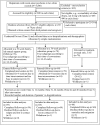A Randomized Controlled Trial on Mutual Support Group Intervention for Families of People With Recent-Onset Psychosis: A Four-Year Follow-Up
- PMID: 30618880
- PMCID: PMC6305581
- DOI: 10.3389/fpsyt.2018.00710
A Randomized Controlled Trial on Mutual Support Group Intervention for Families of People With Recent-Onset Psychosis: A Four-Year Follow-Up
Abstract
Introduction: Recent research in Western countries has indicated that family interventions in schizophrenia and other psychotic disorders can reduce patient relapse and improve medication compliance. Few studies have addressed Chinese and Asian populations. This study tested the long-term effects of a 9-month family-led mutual support group for Chinese people with schizophrenia in Hong Kong, compared with psycho-education and standard psychiatric care. Methods: A randomized controlled trial of Chinese families of patients with recent-onset psychosis (≤5 years of illness) was conducted between August 2012 and January 2017, with a 4-year follow-up. Two hundred and one Chinese families of adult outpatients with recent-onset psychosis were randomly selected from the computerized patient lists and randomly assigned to either mutual support, psycho-education, or standard care group (n = 70 per group). Family caregivers were mainly the parent, spouse, or child of the patients. Mutual support and psycho-education group consisted of 16 two-hour group sessions and patients participated in three sessions. The standard care group and the two treatment groups received the routine psychiatric outpatient care. Results: Patients and families in the mutual support group reported consistently greater improvements in overall functioning [family functioning, F (2, 203) = 8.13, p = 0.003; patient functioning, F (2, 203) = 6.01, p = 0.008] and reductions in duration of hospitalizations [F (2, 203) = 6.51, p = 0.005] over the 4-year follow-up. There were not any significant increases of medication dosages or service use by both the family support and psycho-education groups over time. Conclusions: The peer-led family support group can be an effective psychosocial intervention in early psychosis indicating long-term benefits on both patient and family functioning and re-hospitalizations. Clinical Trial Registration: NCT00940394: https://register.clinicaltrials.gov.
Keywords: family intervention; mutual support group; psycho-education; randomized controlled trial; recent-onset psychosis.
Figures

Similar articles
-
The effectiveness of mutual support group intervention for Chinese families of people with schizophrenia: a randomised controlled trial with 24-month follow-up.Int J Nurs Stud. 2013 Oct;50(10):1326-40. doi: 10.1016/j.ijnurstu.2013.01.004. Epub 2013 Feb 19. Int J Nurs Stud. 2013. PMID: 23433723 Clinical Trial.
-
The effectiveness of manual-guided, problem-solving-based self-learning programme for family caregivers of people with recent-onset psychosis: A randomised controlled trial with 6-month follow-up.Int J Nurs Stud. 2016 Jul;59:141-55. doi: 10.1016/j.ijnurstu.2016.03.018. Epub 2016 Apr 6. Int J Nurs Stud. 2016. PMID: 27222459 Clinical Trial.
-
One-year follow-up of a multiple-family-group intervention for Chinese families of patients with schizophrenia.Psychiatr Serv. 2004 Nov;55(11):1276-84. doi: 10.1176/appi.ps.55.11.1276. Psychiatr Serv. 2004. PMID: 15534017 Clinical Trial.
-
The effectiveness and active ingredients of mutual support groups for family caregivers of people with psychotic disorders: a literature review.Int J Nurs Stud. 2009 Dec;46(12):1604-23. doi: 10.1016/j.ijnurstu.2009.04.003. Epub 2009 May 28. Int J Nurs Stud. 2009. PMID: 19481205 Review.
-
[What support of young presenting a first psychotic episode, when schooling is being challenged?].Encephale. 2017 Dec;43(6):570-576. doi: 10.1016/j.encep.2017.10.001. Epub 2017 Nov 8. Encephale. 2017. PMID: 29128195 Review. French.
Cited by
-
Psychosocial Interventions in the Rehabilitation and the Management of Psychosis and Schizophrenia: A Systematic Review on Digitally-Delivered Interventions.Actas Esp Psiquiatr. 2025 Mar;53(2):379-421. doi: 10.62641/aep.v53i2.1851. Actas Esp Psiquiatr. 2025. PMID: 40071361 Free PMC article.
-
Family Peer Worker Perspectives on the Critical Issues for Family Peer Support in Youth Mental Health Settings.Early Interv Psychiatry. 2025 Jun;19(6):e70066. doi: 10.1111/eip.70066. Early Interv Psychiatry. 2025. PMID: 40536213 Free PMC article.
-
Promoting Psychosocial Health of Family Caregivers of Patients with Chronic Mental Disorders: A Review of Challenges and Strategies.Chonnam Med J. 2023 Jan;59(1):31-47. doi: 10.4068/cmj.2023.59.1.31. Epub 2023 Jan 25. Chonnam Med J. 2023. PMID: 36794251 Free PMC article. Review.
-
Evaluating the Effect of Peer-Assisted Education on the Functioning in Family Caregivers of Patients with Schizophrenia: A Clinical Trial Study.Korean J Fam Med. 2021 Sep;42(5):356-362. doi: 10.4082/kjfm.20.0098. Epub 2021 Sep 20. Korean J Fam Med. 2021. PMID: 34607410 Free PMC article.
-
Psychosocial interventions for carers of people with severe mental and substance use disorders: a systematic review and meta-analysis.Eur Psychiatry. 2023 Nov 24;66(1):e98. doi: 10.1192/j.eurpsy.2023.2472. Eur Psychiatry. 2023. PMID: 37997647 Free PMC article.
References
-
- Gonçalves-Pereira M, Xavier M, van Wijngaarden B, Papoila AL, Schene AH, Caldas-de-Almeida JM. Impact of psychosis on Portuguese caregivers: a cross-cultural exploration of burden, distress, positive aspects and clinical-functional correlates. Soc Psychiatry Psychiatr Epidemiol. (2013) 48: 325–35. 10.1007/s00127-012-0516-7 - DOI - PubMed
-
- Ribé JM, Salamero M, Pérez-Testor C, Mercadal J, Aguilera C, Cleris M. Quality of life in family caregivers of schizophrenia patients in Spain: caregiver characteristics, caregiving burden, family functioning, and social and professional support. Int J Psychiatry Clin Pract. (2018) 22:25–33. 10.1080/13651501.2017.1360500 - DOI - PubMed
-
- American Psychiatric Association Understanding Mental Disorders: Your Guide to DSM-5. Washington, DC: American Psychiatric Publishing; (2014). - PubMed
Associated data
LinkOut - more resources
Full Text Sources
Medical

